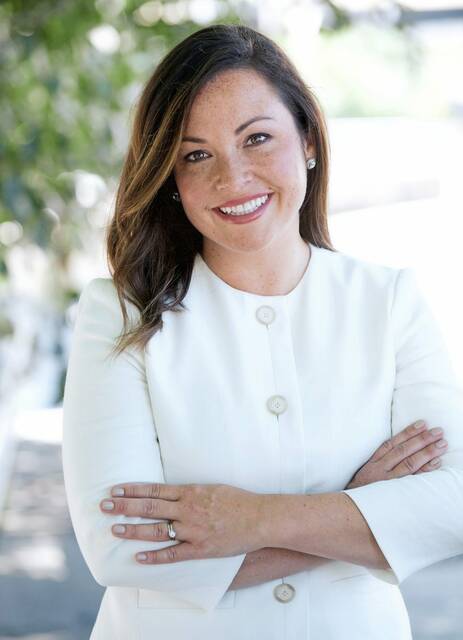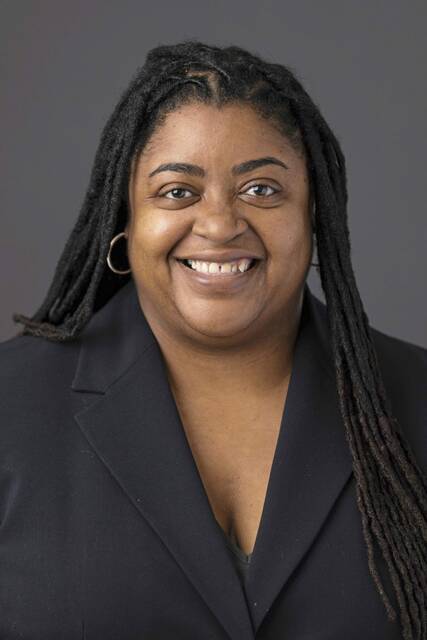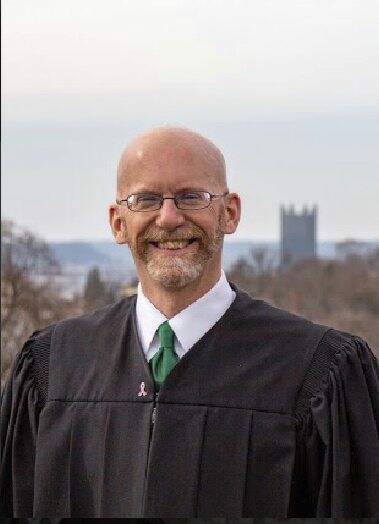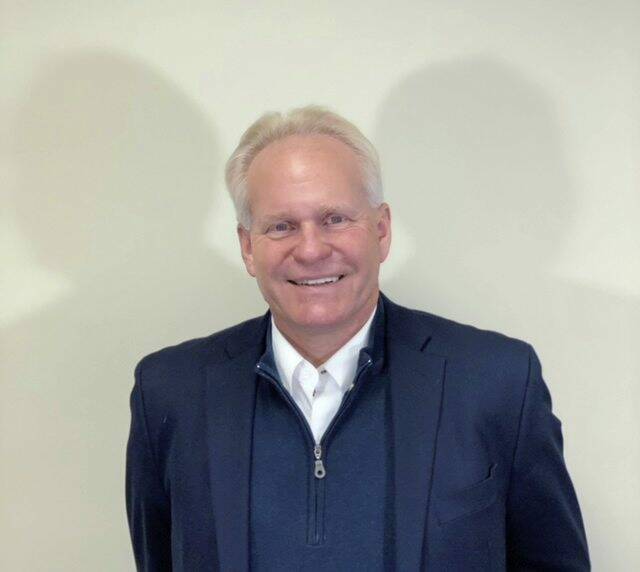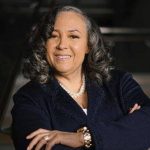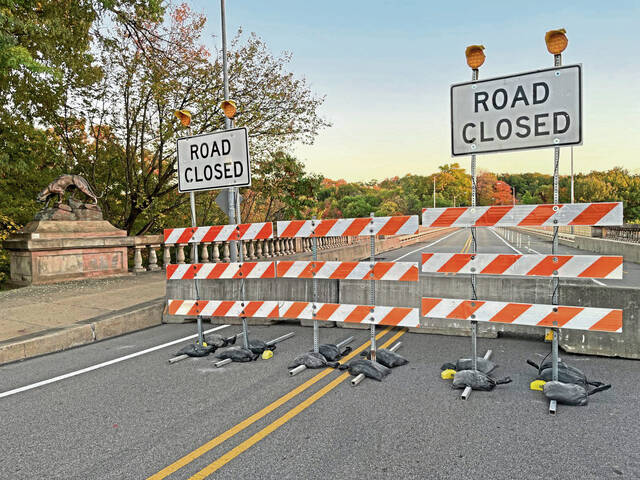Eighteen people, including 12 men and six women, are vying for 10 seats on the Allegheny County Common Pleas bench in Tuesday’s election.
Following is information on each of the candidates, listed in the order that they will appear on the ballot, which includes their Allegheny County Bar Association ratings and their responses to two questions from the Tribune-Review.
The Trib asked each candidate why they want to be a Common Pleas judge and what they felt about President Judge Kim Berkeley Clark saying in June that it was time to combat systemic racism in the county’s judicial system.
Chelsa Wagner, North Point Breeze
Age: 44
Current position: Allegheny County controller
Education: University of Pittsburgh School of Law, 2005
Family: Husband, Khari Mosley; two sons, Thaddeus and Isaiah
Allegheny County Bar Association rating: not recommended at this time
Website: electchelsa.com
Question: Why do you want to be a judge now?
Answer: “I am running for judge because I believe we are at a crossroads. My work has always centered on demanding accountability within our governmental institutions, being a zealous advocate on behalf of our residents, even when that has meant standing up to my own party. I have demonstrated leadership on challenges that many believed to be impossible causes, such as preventing UPMC from denying access to our residents. Presently, we are indeed at a crossroads, where our democracy is challenged by the fragility of our institutions, public mistrust and the very meaning of justice. The times we are in have led me to explore more deeply my own role, as an individual, and more so as a public servant. It is a combination of my own passion for justice, the call to duty of our present times, especially as a mother thinking of the world we will leave our children, that have led me to run for judge on the Court of Common Pleas of Allegheny County.”
Question: In June, President Judge Kim Berkeley Clark posted an open letter on the court’s website saying that it was time for the county’s judicial system to recognize systemic racism and work to combat it. In the letter, she talked about an uneven playing field in the courts and a perception in the public that courts are not fair. How do you feel about Clark’s letter? Do you agree with her position? Why or why not?
Answer: “I believe that the role of a judge is two-fold, to uphold the highest standards in his or her courtroom, but also, and often forgotten, to be a leader within the system of justice, which must stand as the cornerstone of our democracy. Judge Clark has demonstrated a unique ability to make our local court system more accessible to the public, and she happens to be the first Black individual, and Black woman to serve as president judge. Thus, she also has a very important first-person perspective on matters of race generally, and especially in her capacity as a tenured jurist. Statistics unequivocally demonstrate that Black and Brown individuals fare worse than their white counterparts in this country’s justice system, and likewise in Allegheny County. Those statistics, in my opinion, are not partisan. Judge Clark spoke openly about facts, and I wholeheartedly applaud her leadership in doing so.
“If elected, I hope to use the skills that I have demonstrated and harnessed as a public servant who has been willing to do the long and tedious work to hold our institutions accountable. As I noted, I believe the role of a judge is two-fold, working both within and outside of her own courtroom. Our court system has certainly had a number of successes, such as the problem-solving courts, however, we also can do much more to better serve all residents. So if elected, I will not only uphold the highest standards in my own courtroom, but also work to achieve a system that lives up to the standard of ‘justice for all.’ In my years of government service, I have always fought against what I refer to as ‘the culture of no,’ or in other words, I have always fought against a bureaucratic system that continues to do the same thing in spite of better ways to serve the public. Our courts are funded by the public, and the public deserves a court system that is fair, accountable, efficient, transparent and innovative. I am committed to working on the many issues, big and small, to better serve the public. “
Sabrina Korbel, Ross
Age: 44
Current position: Legal director, Women’s Center & Shelter of Greater Pittsburgh
Education: University of Pittsburgh School of Law, 2002
Family: husband, Stephen Korbel; daughters, Addison Korbel and Madeleine Korbel
Allegheny County Bar Association rating: highly recommended
Website: sabrinaforjudge.com
Question: Why do you want to be a judge now?
Answer: “I am running for judge because I am a public servant who is committed to making systemic changes in our courts through collaborative efforts with community partners who do the work in our neighborhoods and communities to create the distribution of justice that is equitable, respectful, compassionate and recognizes the individual needs, authentic stories and life circumstances of the litigants encountering our court system.”
Question: In June, President Judge Kim Berkeley Clark posted an open letter on the court’s website saying that it was time for the county’s judicial system to recognize systemic racism and work to combat it. In the letter, she talked about an uneven playing field in the courts and a perception in the public that courts are not fair. How do you feel about Clark’s letter? Do you agree with her position? Why or why not?
Answer: “Judge Clark has devoted her career to eradicating disparities in the justice system. In her open letter, she identifies present obstacles and systemic barriers; individuals and policies that make real progress toward equity; and steps toward meaningful and tangible change. Judge Clark’s position squarely aligns with my own experiences as an attorney and with my priorities and goals as a judicial candidate. If elected, I will work to expand access to justice through remote services to reduce burdens related to transportation, missed work, and childcare; ensure inclusive and racially and gender equitable court policies and procedures, increase access to the court’s instructions and materials; expand pro se clinics; strengthen services to refugee, immigrant and limited English proficient persons; commit to training for court staff related to implicit bias, trauma and cultural diversity; and increase communication between the different divisions of the court to ensure holistic court services.”
Wrenna Watson, Hill District
Age: 67
Current position: Mental health hearing officer and private practice attorney
Education: Duquesne University School of Law, 1991
Family: Daughter, Michelle Watson; Father, the Honorable Judge J. Warren Watson, 98; Mother, Roberta N. Watson (deceased) and Carole A. (Eckstine) Watson (deceased)
Allegheny County Bar Association rating: recommended
Website: wrennawatson.com
Question: Why do you want to be a judge now?
Answer: “Often encouraged to run, it was not my plan this cycle although people were asking, saying they want to support me. My initial reaction was, ‘Been there. Done that!’ I was content. Running for a county seat is a grueling grind; it takes so much time, energy, money, help and support from others. Then I received ‘the call.’ A friend said, ‘Wrenna. I don’t mean to impose upon you but we need you on the bench. Our community needs you.’ The resonance within my soul gave cause for consideration. I consulted my ‘kitchen cabinet.’ My daughter, Michelle Watson, the wind beneath my wings, exclaimed, ‘Let’s do this. Mom, let’s win this.’”
Question: In June, President Judge Kim Berkeley Clark posted an open letter on the court’s website saying that it was time for the county’s judicial system to recognize systemic racism and work to combat it. In the letter, she talked about an uneven playing field in the courts and a perception in the public that courts are not fair. How do you feel about Clark’s letter? Do you agree with her position? Why or why not?
Answer: “I respect, love and appreciate President Judge Kim Berkeley Clark and her ‘Message from the President Judge.’ “I applaud her courage as our leader: taking a stand, making a bold statement, balancing what is done well, acknowledging the need to change, to be fair, to be inclusive. Clark envisions a judicial system both equal and equitable. Equality means each individual or group of people is given the same resources or opportunities. Equity recognizes that each person has different circumstances and allocates the exact resources and opportunities needed to reach an equal outcome. All voices need to be at the table.
“I am proud to be one of the 10 diverse candidates nominated for judge. Whosoever wins will be part of a changed court possessed with unprecedented opportunity and responsibility. Change is forthcoming and imminent.
“I am aware of and will work to approve and implement changes our system needs. Some of the changes required to ensure equality and equity will take time, i.e., legislative amendments or modifications of judicial and/or local rules. What can be effectuated immediately is what happens each day in the courtroom. Each case, every day, each judge has the opportunity to exercise equal and equitable treatment. What I know is that I have exhibited equal, equitable justice and treatment to all citizens of Allegheny County for 26 years as judge of the minor judiciary in over 50,000 cases. There, my reputation is that I am fair, I listen to both sides of the case, that I treat everyone with respect and insist that everyone in my courtroom treats everyone else with respect. It is my personal imperative.”
Lisa Middleman, Franklin Park
Age: 59
Current position: Allegheny County Office of the Public Defender, Major Felony Unit; private practice
Education: University of Pittsburgh School of Law, 1987
Family: divorced with two children, Madison and Matthew
Allegheny County Bar Association rating: recommended
Website: lisamiddleman.com
Question: Why do you want to be a judge now?
Answer: “My 35 years of experience in successfully preparing and trying the most complex and life-altering cases, including death penalty cases, and in directing the teams involved in that endeavor, have provided me with the opportunity to research and present arguments regarding the effects that violence, mental health problems, poverty, trauma and addiction can have, not only on individuals, but on their families, victims and the neighborhoods in which they live. I have demonstrated not only my ability to work very hard to resolve complex issues, but also a deep appreciation of the significance that my judgment may have, not only on the people who appear before me, but on their families and on the community.
“My career has been one of service to the Constitution and to the people of Allegheny County. I wish to be a judge to continue that service in a way that will ensure equity and fairness to all that come before me and to positively impact the fair operation of our systems.”
Question: In June, President Judge Kim Berkeley Clark posted an open letter on the court’s website saying that it was time for the county’s judicial system to recognize systemic racism and work to combat it. In the letter, she talked about an uneven playing field in the courts and a perception in the public that courts are not fair. How do you feel about Clark’s letter? Do you agree with her position? Why or why not?
Answer: “I was heartened to read Judge Clark’s letter acknowledging the barriers to justice that many people face and the public perception that the courts do not always operate as a tool to resolve conflicts. The very first Canon of Judicial Ethics compels judges to act in a manner that promotes public confidence in the independence, integrity and impartiality of the judiciary. Judge Clark’s call to examine the operation of the legal system in Allegheny County by collecting and examining data is critical and fulfills that mission. If elected, I will follow her lead by being transparent in my decision-making process. It is also my intention to work with the other forward-thinking judges, and to communicate with the communities that the courts serve, to create an environment where equity, fairness and access to the courts is promoted and preserved.”
Nicole Henry-Taylor, Ross
Age: 49
Current position: Attorney, Henry-Taylor Law, PC; Director of Diversity and Inclusion, Duquesne University School of Law
Education: Duquesne University School of Law, 1996
Family: Married to Robert Taylor, a retired correctional officer who worked at Western Penitentiary before retiring. Two adopted children in the 11th grade and 8th grade.
Allegheny County Bar Association rating: highly recommended
Website: nicola4judge.com
Question: Why do you want to be a judge now?
Answer: “My desire to be a judge is driven by my passion for equity, diversity and inclusion. I am keenly aware that I would add diversity of thought, and experience, as a woman of color that is underrepresented in our judicial system. I have been an advocate for diversity and inclusion throughout my career, and I believe that that is something that I will want to continue on the bench as we face challenging times with systemic bias and social justice issues.
“I have been a litigator throughout most of my career, and I spend many days in court. I appreciate having the opportunity to play a role in the judicial system. I have been blessed with many wonderful role models in judges over the years. It is my ambition that I would be given the privilege of becoming one of those judges that I truly admire and to be a role model to other women of color.”
Question: In June, President Judge Kim Berkeley Clark posted an open letter on the court’s website saying that it was time for the county’s judicial system to recognize systemic racism and work to combat it. In the letter, she talked about an uneven playing field in the courts and a perception in the public that courts are not fair. How do you feel about Clark’s letter? Do you agree with her position? Why or why not?
Answer: “President Judge Clark is a role model of mine, and I believe her letter gets at the core of not only what drove me to become a judge, but also what is the root of much of the activism we have seen in recent years — systemic challenges that the court will face over the coming years. I look forward to working with her to address these concerns and ensure equitable justice for all if elected on November 2nd.
“There are many policies we can put in place to further equitable justice. Most importantly, I believe that judges must be servant leaders and lead with empathy and understanding. It is critical that we stay engaged in the community and have an understanding of the realities of the experiences of the people that come in front of us in the courtroom. Everything from increased language access to diversionary courts help bring us closer to equitable justice.”
Elliot Howsie, Churchill
Age: 53
Current position: Judge of the Court of Common Pleas
Education: Duquesne University School of Law, 1998
Family: Married to Melissa Arnold; two sons, Elliot and Evan
Allegheny County Bar Association rating: highly recommended
Website: elliothowsie.org
Question: Why do you want to be a judge now?
Answer: “I was appointed to fill a vacant seat on the Allegheny County Court of Common Pleas in 2019. I believe that my prior life experience, my work experience and my perspective uniquely qualifies me to continue to serve as a judge.
“Growing up in Wilkinsburg, I have seen the impact that poor decision-making, addiction and mental health issues, as well as the lack of opportunity, can have on one’s life. Given my prior role as the chief public defender, and my prior experience as a prosecutor and defense attorney, I have an in-depth understanding of the issues that result in people becoming involved in our criminal justice system. Because of my past work experience as well as my belief that it is the responsibility of the courts to equip people with the ability to move on with their lives after being involved with the criminal justice system, I want to continue to serve as a judge.”
Question: In June, President Judge Kim Berkeley Clark posted an open letter on the court’s website saying that it was time for the county’s judicial system to recognize systemic racism and work to combat it. In the letter, she talked about an uneven playing field in the courts and a perception in the public that courts are not fair. How do you feel about Clark’s letter? Do you agree with her position? Why or why not?
Answer: “Judge Clark is someone that I greatly respect and admire. I do agree with the position that Judge Clark took in her letter. Although the Allegheny County Court of Common Pleas is routinely regarded as the best court in the Commonwealth of Pennsylvania and one of the best courts in the entire country, judges have a continuing responsibility and obligation to work toward ensuring that the criminal justice system is more equitable and just. I further believe that each stakeholder shares the same responsibility.
“Currently in Allegheny County Jail, 53% of the population is incarcerated as a result of misdemeanor offenses. While 19% of the jail population is incarcerated as a result of crimes of violence. The Allegheny County Jail population has increased by 62% despite the fact that property crimes are down 46% and violent crime has decreased by 32%. Furthermore, people of color make up approximately 13% of the population but account for 67% of the jail population. As a result, public trust in our criminal justice system is eroding and people believe that the system is unfair.
“Consistent with Judge Clark’s assertions, every stakeholder has an obligation to work tirelessly to ensure equal justice under law. Changes that are needed will not occur overnight. However, I have spent my entire career working to effectuate change in our system.
“As the director of the public defender’s office, I developed initiatives that resulted in an 18% reduction in jail admissions. As a judge in the Criminal Division, I have limited the usage of pretrial detention for nonviolent offenses. Additionally, I have been very intentional about imposing sentences and addressing probation violations, thereby reducing the likelihood that people will needlessly spend inordinate periods of time in jail for nonviolent offenses and probation violations. All of these approaches combined enable people, charged with nonviolent offenses and low-level probation violations, to attend drug and mental health treatment.”
Tiffany Sizemore, Churchill
Age: 43
Current position: Associate clinical professor, Duquesne University School of Law
Education: Howard University School of Law, 2004
Family: In a committed relationship, no children; I am an only child — Mom is a retired teacher who lives in Wilkinsburg, Dad was a short-order cook who is deceased
Allegheny County Bar Association rating: recommended
Website: https://votetiffanysizemore.com/
Question: Why do you want to be a judge now?
Answer: “As a native Pittsburgher, I know that now is a pivotal time for our community. We are in the midst of a generational shift in leadership across many institutions in our county, and I want to be one of the voices at the forefront of that leadership. Our region is at a crossroads. We can either continue to ignore the obvious problems around gender, racial and socioeconomic disparities or we can face them head-on and begin the important work of crafting holistic, data-driven solutions to create justice and equity across these institutions. This historic moment requires compassionate, innovative and thoughtful leaders. I believe that I am well-qualified to be one of the 10 new voices working on these issues in our courts.”
Question: In June, President Judge Kim Berkeley Clark posted an open letter on the court’s website saying that it was time for the county’s judicial system to recognize systemic racism and work to combat it. In the letter, she talked about an uneven playing field in the courts and a perception in the public that courts are not fair. How do you feel about Clark’s letter? Do you agree with her position? Why or why not?
Answer: “I agree with President Judge Clark’s letter in the strongest possible terms. Her letter is a critical first step in acknowledging the obvious: The problems with racial inequity in the criminal and juvenile legal systems are both historic and present in Allegheny County and around the country. It is a problem that cannot be confronted or changed until it is faced with intellectual honesty. Individual judges, and the court as an institution, cannot be honest brokers in creating solutions unless they first acknowledge their role in the problem. We should not elect anyone to this position who is not willing to work, in earnest, on reducing racial disparities in the Allegheny County court system. I am deeply grateful for President Judge Clark’s leadership and willingness to work on this issue.
“I am a 17-year litigator with significant trial experience, and I am well-qualified to preside over cases on a daily basis. But as a veteran litigator, I can say, unequivocally, that being able to preside over cases is good, but it’s not enough. We need judges who are willing to do the policy work outside of the courtroom in order to make systemic improvements if we have any hope of making progress in addressing equity. In addition to my practice, I have spent the last several years of my career working on policy related to juvenile justice at the local, statewide and national level. I have sat with both community and system stakeholders to listen, learn and do the work. I will continue and expand that work as a judge.”
Bruce Beemer, Bradford Woods
Age: 53
Current position: Judge on Court of Common Pleas
Education: University of Pittsburgh School of Law, 1995
Family: Wife, Jodi, son, Jackson, daughter, Jordan
Allegheny County Bar Association rating: highly recommended
Website: KeepJudgeBeemer.com
Question: Why do you want to be a judge now?
Answer: “A judge holds a truly unique and special place in upholding our system of justice. I have spent much of my legal career in a courtroom arguing cases and have seen firsthand the effect — both positive and negative — that a judge can have on both the actual and perceived level of fairness that litigants receive when their day in court arrives. Our legal system should be the finest in the world, but in many respects, it is only as strong as its judges’ ability to dispense justice competently and fairly. The challenge I face in the courtroom as a judge, to handle matters fairly, efficiently and competently, is as great a weight as any I could face in my legal career. I have spent a great deal of my legal career in public service, and there is no more important way to serve than to seek to ensure that all who come before a court receive a fair and unbiased review of their case.”
Question: In June, President Judge Kim Berkeley Clark posted an open letter on the court’s website saying that it was time for the county’s judicial system to recognize systemic racism and work to combat it. In the letter, she talked about an uneven playing field in the courts and a perception in the public that courts are not fair. How do you feel about Clark’s letter? Do you agree with her position? Why or why not?
Answer: “The courts must continue to eradicate all forms of bias and exhibit zero tolerance for racism. It’s critical that the mission to support equitable treatment of all parties include increased access to services for indigent litigants, ongoing implicit bias training and an unwavering commitment to fairness. I pledge to work with our president judge and all my colleagues to further these goals.”
Jessel Costa, South Side Slopes
Age: 34
Current position: Attorney, Attisano & Romano
Education: Duquesne University School of Law, 2012
Family: Jessel is engaged to illustrator Erin Kenna
Allegheny County Bar Association rating: unqualified; did not appear before association’s judiciary committee for evaluation.
Website: jesselcosta.com
Question: Why do you want to be a judge now?
Answer: “Because we are presented with a unique opportunity to reinvigorate and reform the judiciary in Allegheny County, and because I have concrete ideas to implement that reform which makes our system more accessible, more equitable and more just. A few of those ideas include: an earlier review of preliminary bail decisions in criminal cases — while magisterial district judges set bail, common pleas judges should more quickly review those decisions and make changes necessary to prevent citizens from languishing in jail pre-trial; an increase in the number of diversionary court programs and more inclusive admissions criteria for those programs — programs that center rehabilitation over incarceration should be the default for citizens interacting with the criminal justice system; sentencing reforms that seek to address the problems in our probation/parole systems.”
Question: In June, President Judge Kim Berkeley Clark posted an open letter on the court’s website saying that it was time for the county’s judicial system to recognize systemic racism and work to combat it. In the letter, she talked about an uneven playing field in the courts and a perception in the public that courts are not fair. How do you feel about Clark’s letter? Do you agree with her position? Why or why not?
Answer: “I agree that, based upon the history of our country, all of our institutions suffer from issues related to systemic and structural inequalities — the judiciary is not immune. With that in mind, judges should always seek to dispense justice without regard to race, gender identification, sexual orientation or financial status.
“To address these concerns, I believe that it is important to focus on the types of procedural reforms and diversionary programs that Judge Clark mentioned in her statement, and that I mentioned above. Judges must also work individually to ensure that each courtroom lives up to the promise of “justice for all.”
Tom Caulfield, Forest Hills
Age: 55
Current position: Magisterial district judge
Education: University of Pittsburgh School of Law, 1991
Family: wife, Lisa Caulfield; five children between the couple, all boys, including two named Alex. Their ages range from 14 to 30.
Allegheny County Bar Association rating: highly recommended
Website: judgecaulfield2021.com
Question: Why do you want to be a judge now?
Answer: “I believe that my experience would make me a good fit for the Court of Common Pleas at a time when it is experiencing the largest turnover in 50 years. With so many positions to be filled by newly elected judges, a wide-ranging background will be critical. I was an attorney with the Office of the Public Defender for the first 19 years of my practice, serving in management up to the position of deputy director. I had a private law practice for my first 12 years which allowed me to practice in every division in the court, as well as practice in eight other counties and federal court as well.
“Since 2010, I have been a magisterial district judge, hearing thousands of cases in every area of the law, so I would be prepared to serve in any division on Day One. I am a well rounded candidate.”
Question: In June, President Judge Kim Berkeley Clark posted an open letter on the court’s website saying that it was time for the county’s judicial system to recognize systemic racism and work to combat it. In the letter, she talked about an uneven playing field in the courts and a perception in the public that courts are not fair. How do you feel about Clark’s letter? Do you agree with her position? Why or why not?
Answer: “As an attorney with the Office of the Public Defender for 19 years, I had a number of clients who I felt were treated unfairly because of their poverty, race or disability. Some instances involved the circumstances of their arrest, some the way the cases were prosecuted and others how the courts disposed of their charges. In most cases, I believe that the participants did not intentionally treat my clients more harshly, but the cumulative effect was an injustice. I know from discussions with colleagues that many share my experience.
“The role of the court should be to ensure that all who come before it can be confident that their cases will be decided on the merits of their claims and not the biases of the judge. All parties must have faith in the fairness of the system, or public trust will be further eroded.
“Since I have been a judge in the minor judiciary for over a decade, I have been working to ensure the process I follow is fair and unbiased. Every time I make a decision I review it to guarantee that I am following the law and applying the facts in an impartial manner.
“I am currently a member of a large working group that is studying the issue of racial disparities in the county criminal system. I am very confident that this group will identify where the system has failed and suggest solutions to improve the court’s performance. Lastly, I am part of a pilot project to bring together local officials, police officers, prosecutors and community stakeholders to develop a diversionary program to get people experiencing behavioral health or drug and alcohol issues the help they need to avoid further entanglements with the criminal justice system.”
Joseph Patrick Murphy, Pine
Age: 52
Current position: Practicing in a two-attorney law firm
Duquesne University Law School, 1998
Family: Wife and two sons
Education: Allegheny County Bar Association rating: not recommended at this time; did not appear before association’s judiciary committee for evaluation.
Website: josephpatrickmurphy.com
Question: Why do you want to be a judge now?
Answer: “Pitt Law School has one two-credit course in Immigration Law. Pitt also offers an immigration clinic where students can try to help people. Duquesne Law School offers no immigration courses at all. Immigration law is not tested on the Bar Exam. We are trying to build a futuristic, perhaps even progressive, immigrant-friendly, city, county and region. If we’re going to do that, we will need judges and lawyers who understand the special challenges faced by people going through immigration. I have been a humanitarian immigration lawyer for over 20 years. I want to bring my experience, and the patience and understanding that comes from it, to our court system.”
Question: In June, President Judge Kim Berkeley Clark posted an open letter on the court’s website saying that it was time for the county’s judicial system to recognize systemic racism and work to combat it. In the letter, she talked about an uneven playing field in the courts and a perception in the public that courts are not fair. How do you feel about Clark’s letter? Do you agree with her position? Why or why not?
Answer: “I am glad Judge Clark wrote this. I agree that the struggle continues, and should continue. I hope to see a specialty court for non-citizens where immigration consequences are understood, explained and, if possible, mitigated.”
Anthony DeLuca, Mt. Lebanon
Age: 49
Current position: Partner, Law Firm of DeLuca, Ricciuti and Konieczka
Education: University of Pittsburgh School of Law, 1997
Family: Wife, Hollie; three children, ages, 12, 10, 8
Allegheny County Bar Association rating: highly recommended
Website: deluca4judge.com
Question: Why do you want to be a judge now?
Answer: “I am the only candidate that has worked closely with all three of the main participants in the criminal justice system: victims, defendants and their families, and law enforcement. Having represented all three of these groups at various points in my career, I have a uniquely balanced perspective on the people drawn into the court system. I have a better understanding of who is dangerous and should be incarcerated, and who needs treatment without incarceration. By understanding the stresses and burdens of those involved in the system, I will be in a position through programs and rulings to further the goal of justice for all.
“I was a major participant in the development of Allegheny County’s mental health court and continue to work with individuals charged with crimes who have mental health challenges. Therefore, I have direct real-world experience in treating non-violent offenders instead of warehousing them in prison.”
Question: In June, President Judge Kim Berkeley Clark posted an open letter on the court’s website saying that it was time for the county’s judicial system to recognize systemic racism and work to combat it. In the letter, she talked about an uneven playing field in the courts and a perception in the public that courts are not fair. How do you feel about Clark’s letter? Do you agree with her position? Why or why not?
Answer: Declined to answer.
Daniel J. Konieczka Jr., Shaler
Age: 61
Current position: Magisterial district judge, Shaler, Etna, Millvale and Reserve
Education: University of Pittsburgh School of Law, 1986
Family: Married 34 years to Maureen Barrett; oldest of eight children and “favorite” uncle to 19 nephews and nieces
Allegheny County Bar Association rating: highly recommended
Website: dankforjudge.com
Question: Why do you want to be a judge now?
Answer: “Thirty-four years ago, as a young litigating attorney, I, along with several of my colleagues aspired to be trial judges in the court of common pleas. My reason those many years ago remains true today, to serve our community. I learned that courtroom decisions not only impact the pending litigants and victims, but many tangentially involved, such as litigants’ family members and possibly other similarly situated individuals as the litigants. As a prosecutor for 23 years, a criminal defense attorney appointed to represent indigent defendants in federal court and now as a magisterial district judge, I learned how impactful that which happens in the courtroom can have on our community. Currently, as a district judge, I see how my decisions may impact a variety of individuals. I take great care in every decision that I make to be fair and equitable to all litigants. I will do the same at the common pleas court.”
Question: In June, President Judge Kim Berkeley Clark posted an open letter on the court’s website saying that it was time for the county’s judicial system to recognize systemic racism and work to combat it. In the letter, she talked about an uneven playing field in the courts and a perception in the public that courts are not fair. How do you feel about Clark’s letter? Do you agree with her position? Why or why not?
Answer: “I believe perception of the courts and the criminal process is just as important as the nuts and bolts. Every judge and every decision should be sensitive on how they impact our community. I have already taken steps by being a member of the racial equity working group for the past several months, where we meet monthly to identify and provide corrective recommendations for the criminal justice process. The knowledge I gather from this experience along with my 34 years of experience in dealing with victims, police officers and the accused provides me with the tools to address any concerns.”
William Bill Caye, South Fayette
Age: 53
Current position: founding and managing member William F. Caye II, LLC – Professional, Legal & Consulting Services
Education: Duquesne University School of Law, 1993
Family: wife, Tammy Gaydos Caye; sons, Billy and Adam Caye
Allegheny County Bar Association Rating: recommended; had pre-existing rating from 2017 or prior when questionnaires were not made public because they contained confidential information.
Website: williamcaye.com
Question: Why do you want to be a judge now?
Answer: “I am seeking this position to capably solve difficult legal problems, in our courts, for all citizens by using my unique and diverse courtroom experience and proven abilities in the community to dispense justice with proper balance and to decide all cases applying the law fairly, timely, compassionately, consistently and impartially.”
Question: In June, President Judge Kim Berkeley Clark posted an open letter on the court’s website saying that it was time for the county’s judicial system to recognize systemic racism and work to combat it. In the letter, she talked about an uneven playing field in the courts and a perception in the public that courts are not fair. How do you feel about Clark’s letter? Do you agree with her position? Why or why not?
Answer: “I cannot comment on the statement of the president judge. I can only be the professional person I have been my extensive career by treating those with different perspectives with inclusivity, dignity and a true respect for the rule of law; and to provide innovative, accessible and accountable public service, as an independent or nonpartisan judicial officer, in accordance with the clear mandates and oath of office. Every citizen will be heard, given a reasonable opportunity to persuade, and treated with courtesy and fairness should I be elected by the people to serve.”
Chuck Porter, Shaler
Age: 63
Current position: defense attorney in private practice since 1987
Education: Duquesne University School of Law, 1985
Family: four daughters: Ellen Revay, Emily Porter, Elizabeth Porter and Alexandra Porter-Vrbanic
Allegheny County Bar Association rating: recommended
Website: chuckporterforjudge.com
Question: Why do you want to be a judge now?
Answer: “As a trial lawyer for 36 years, I believe that I am well suited to be a common pleas court judge. We need judges who are experienced, who have been involved in jury trials, who understand how to select a jury and to timely and properly make evidentiary rulings. We are losing many experienced, competent judges and need lawyers to replace them in what is a trial court. I have tried cases throughout the Commonwealth of Pennsylvania and in the U.S. District Courts for the last 36 years. We are somewhat unique in Allegheny County with the percentage of bench trials conducted. I believe that this speaks loudly to the fairness of our bench here.”
Question: In June, President Judge Kim Berkeley Clark posted an open letter on the court’s website saying that it was time for the county’s judicial system to recognize systemic racism and work to combat it. In the letter, she talked about an uneven playing field in the courts and a perception in the public that courts are not fair. How do you feel about Clark’s letter? Do you agree with her position? Why or why not?
Answer: “I believe that in many cases there is an uneven playing field in our criminal division. In my opinion, this is largely due to poverty and lack of resources. The lack of resources impacts a person’s ability to properly defend a case. I have practiced extensively in the U.S. District Courts, and have seen the resources available to the federal public defenders and the court-appointed lawyers under the Criminal Justice Act. These resources are much less available to our public defender’s office and to lawyers appointed in our county. Many people charged with crimes cannot afford a lawyer. They can’t afford investigators or experts who can challenge the prosecution’s evidence. I would expect a lawyer in my courtroom to represent their clients as if they were privately retained, without being fearful of zealously advocating for them. I have represented a diverse group of clients over my three decades of private practice and have thought about how the criminal justice system must seem to them. Can you imagine how it feels for a client to be the only Black person in the entire courtroom? One way a judge can be cognizant of this is in hiring his staff. More importantly, a judge must be vigilant to ensure a fair and impartial jury of the accused’s peers.”
Mark Patrick Flaherty, Mt. Lebanon
Age: 59
Current position: Attorney
Education: Duquesne University School of Law 2001
Family: Wife, Anne; daughter Deirdre
Allegheny County Bar Association rating: not recommended at this time
Website: flaherty4judge.net
Question: Why do you want to be a judge now?
Answer: “Using my 20 years of legal experience to make sure your case gets a fair trial.”
Question: In June, President Judge Kim Berkeley Clark posted an open letter on the court’s website saying that it was time for the county’s judicial system to recognize systemic racism and work to combat it. In the letter, she talked about an uneven playing field in the courts and a perception in the public that courts are not fair. How do you feel about Clark’s letter? Do you agree with her position? Why or why not?
Answer: Declined to answer.
Rick Hosking, Upper St. Clair
Age: 66
Current position: civil trial lawyer, solo practitioner
Education: University of Pittsburgh School of Law, 1980
Family: three daughters; two granddaughters
Allegheny County Bar Association rating: recommended
Website: rickhosking.com
Question: Why do you want to be a judge now?
Answer: “I am the best candidate based on my: 1) 40-plus years of complex civil trial experience in more than 75 state and federal courts; 2) service as a certified mediator, arbitrator and trial advocacy teacher; 3) national and local recognition for excellence in the legal profession; 4) commitment and service to help create and maintain diversity in the legal profession in my capacities as hiring partner at a very large law firm, and as a member of the bar association’s Committee for Opportunities for Minorities in the Legal Profession; 5) significant service in pro bono cases for numerous classes of persons; 6) lifelong commitment to, and leadership roles in, community and charitable causes and organizations relating to juvenile diabetes, United Way, persons with disabilities, Boy Scouts, Pitt Law and Dartmouth College; 7) continual commitment to promote equality, diversity, fairness and integrity in the judicial system for all citizens of Allegheny County.”
Question: In June, President Judge Kim Berkeley Clark posted an open letter on the court’s website saying that it was time for the county’s judicial system to recognize systemic racism and work to combat it. In the letter, she talked about an uneven playing field in the courts and a perception in the public that courts are not fair. How do you feel about Clark’s letter? Do you agree with her position? Why or why not?
Answer: “As one of the three branches of government, the judicial system is in the unique position of interpreting, applying and enforcing the law as written and enacted by legislators who are elected by their constituents and who have a direct obligation to their constituents in that regard. Every judge in our court system should vow to act, decide and issue rulings based solely on the law, using values of honesty, equality, fairness and integrity. Each of the judges who serve must uphold those values for our system to work. Judges are not permitted to, nor should they ever, make their decisions based on politics or personal biases and beliefs. That is what makes the role of being a judge so important to our society.”
Richard L. Weiss, Bethel Park
Age: 54
Current position: Contract attorney with Special Counsel Inc.
Education: University of Denver law school, 1992
Family: Parents owned Weiss Bakery in Brentwood; son, Geoff
Allegheny County Bar Association rating: N/A
Website: https://www.alleghenygreens.org/platform/candidates
Question: Why do you want to be a judge now?
Answer: “I am in favor of using restorative justice as an alternative to incarceration as much as possible. I believe restorative justice has better success and results in lower rates of reoffending than traditional methods of punishment. Restorative justice is a collaborative process involving repair of the harm to victims, apology and focuses on reintegration into the community. I would be willing to follow examples where restorative justice has been used successfully. I am opposed to the use of cash bail. Through the use of cash bail, many are incarcerated who have not been convicted of any crime. Eliminating cash bail will reduce prison population and save taxpayers money. If the accused does not appear for their court date, it is the same as when a defendant who has posted bail does not appear for their court date. A warrant can be issued for their arrest, and then they can be held pending trial. In certain cases defendants who present a danger to the community are held without bail pending trial. In all other cases, it would be a travesty of justice to incarcerate defendants who have not been convicted of a crime for no other reason than lack of money.”
Question: In June, President Judge Kim Berkeley Clark posted an open letter on the court’s website saying that it was time for the county’s judicial system to recognize systemic racism and work to combat it. In the letter, she talked about an uneven playing field in the courts and a perception in the public that courts are not fair. How do you feel about Clark’s letter? Do you agree with her position? Why or why not?
Answer: “President Judge Clark is spot on correct. I agree 100% with everything in her letter, and if elected I would do everything in my power to further the reforms she enumerated as well as pursue any more that may be helpful to end inequality, inequity, lower the county jail population and save taxpayers’ money. I am a firm supporter of restorative justice. In addition, if elected, I pledge to waive all cash bail and accept no charges based solely on possession or use of cannabis.”



